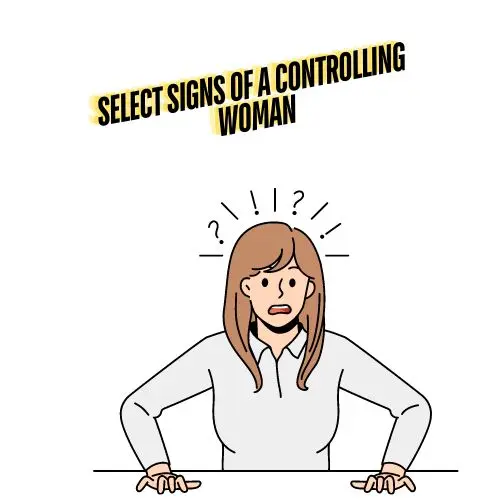Introduction
While having a few degrees of control in courting is every day and anticipated, too much manipulation over an accomplice may destroy a wholesome dynamic. Signs of immoderate management are a pink flag and should not be ignored now. This text reveals signs and symptoms indicating a lady is being controlled in her courting.
TABLE 1: Statistics on controlling relationships in the US
- 35% of women and 29% of men suggested experiencing controlling conduct from a companion in their lifetime. (CDC, )
- People who revel in controlling conduct from partners are more likely also to experience physical violence, emotional abuse, and stalking. (CDC, )
- Jealousy and possessiveness are most of the maximum normally mentioned early signs of controlling dating. (Psychology Today)
- Financial management, like proscribing a companion’s right of entry to to price range or tracking spending, is a form of control exhibited in 20-30% of abusive relationships. (Psychology Today)
- Lack of belief in an accomplice’s movements and accusations of dishonesty are crimson flags, even though infidelity hasn’t taken place, as they suggest the projection of 1’s personal insecurities onto the connection. (Psychology Today)
A Need for Control

Underlying a controlling behaviour pattern is typically a psychological need for dominance, power, and control over one’s partner. While the reasoning is complex, with many potential root causes, at the core are low self-esteem, insecurity, jealousy, trust issues, and a fear of loss of control or abandonment. An unhealthy preoccupation with how a partner spends their time, communicates with others, dresses, and socializes are all ways a controlling person asserts their influence.
Sign 1: Excessive Jealousy and Possession
One of the most notable signs is an unreasonable jealousy towards an innocent partner. This includes excessive questioning about any interactions with the opposite sex, strict rules around communication and socializing, frequent accusations of cheating without proof, surveillance of technology and social media, and an expressed sense that a partner “belongs” to the jealous person.
Healthy relationships allow for privacy and trusting a partner’s judgment without suspicion. Excess jealousy and possessive claims about a partner’s behaviour indicate deep-seated trust issues and control motives.
Sign 2: Isolation from Family and Friends
Attempts to purposefully isolate a partner from their supportive social circle is a clear tactic to gain control. This can look like forbidding contact, criticizing relationships, not allowing visits, monitoring calls and texts, and creating scenarios where a partner spends all free time with only the controlling person.
Close bonds provide a lifeline and reality check against manipulation. By distancing victims, abusers have a freer reign over their thoughts and access. Independence is stifled.
Sign 3: Strict Rules and Demands
A dominant display is micro-managing a partner’s daily activities, spending habits, clothing choices, schedules, and leisure time through imposed rules and demands. It robs autonomy and asserts that a partner’s life revolves solely around the controller’s preferences and whims.
Healthy relationships respect each person’s freedom and decision-making. Control manifests through “my way or the highway” ultimatums devoid of compromise.
Sign 4: Emotional Manipulation
Gaslighting, guilt-tripping, threatening abandonment as punishment, withholding affection, and other emotionally abusive acts intended to manipulate a partner into compliance are controlling ploys. Victims are made to second-guess themselves through lies and manufactured versions of reality.
Loving partners build each other up with empathy, validation and caring support during disagreements – not tear them down.
Sign 5: Financial Control
Restricting a partner’s access to family funds, demanding an accounting of independent earnings, and prohibiting work against the controller’s approval all restrict financial independence. It establishes power through money as a tool of control.
Autonomy includes private financial matters without oversight, so denying it breeds dependence conducive to control.
Sign 6: Threats and Intimidation
Using aggressive outbursts, physical violence or the threat thereof to strike fear into a partner and manipulate them is a sign of an abusive controller. Victims are kept walking on eggshells to avoid triggering rage.
Healthy arguments are resolved through respectful communication free of threats to coerce compliance through intimidation.
Other Common Signs
- Hypercriticism of every small mistake or flaw erodes self-esteem
- Gaslighting about past events and conversations to sow doubt
- Covert surveillance through tech, searching belongings, stalking
- Isolating a partner during arguments to gain the upper hand
- Destroying cherished possessions or harming pets as retaliation
- Threatening to harm self or take own life if abandoned
- Blaming others for the controller’s harmful actions
The Impact on Victims

Controlling partners chip away at their victims’ sense of identity, independence, safety, mental well-being, and overall quality of life over time. Constant scrutiny, lack of privacy, fragility of free will, and trauma of abuse take their toll. Victims often feel they are “walking on eggshells” to avoid setting off fits of rage or punishments from controllers.
Low self-esteem, depression, anxiety, PTSD and other issues commonly develop. Relationships with friends and family deteriorate due to the isolating tactics of abusers. Leaving is rarely a simple choice due to emotional manipulation, economic dependence, fear of escalation, or disruption of normalcy from the control exerted for so long.
Expert Advice

According to relationship experts, when multiple signs are present, control has warped the relationship dynamic in an unhealthy way. Early signs should not be dismissed or justified away. Speaking to counsellors who specialize in abusive relationships can help objectively assess warning signs.
If control persists despite voicing concerns, more serious steps may be considered, like temporarily limiting contact, enlisting the social circle as a support system, creating financial independence, or leaving altogether if safety is at risk. Above all, controlling behaviour is never the victim’s fault, and help is available at hotlines for those in unsafe situations to gain perspective and options.
With a commitment to personal growth, controlling individuals can overcome toxic tendencies through therapy and counselling. But the responsibility lies with them, and victims should avoid promises to change until they consistently demonstrate progress over time. Leaving may, unfortunately, be the safest choice when control remains entrenched despite efforts to establish trust and respect.
Conclusion
While some degree of care, guidance and compromise are natural in partnerships, controlling behaviour severely damages relationships, mental well-being and personal freedom. If encountering excessive jealousy, possession, isolation, manipulation or any consistent signs of being controlled – trust the warning signs. Speak to counsellors, trusted friends or hotlines to objectively view the situation. Your safety and happiness deserve a partner who treats you as an equal, not an object of dominance. With help, controlling cycles can be broken for both parties to establish equitable ground rules respecting autonomy.

